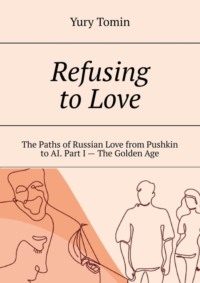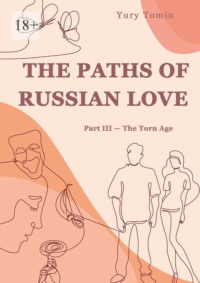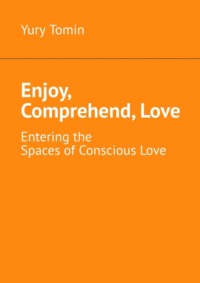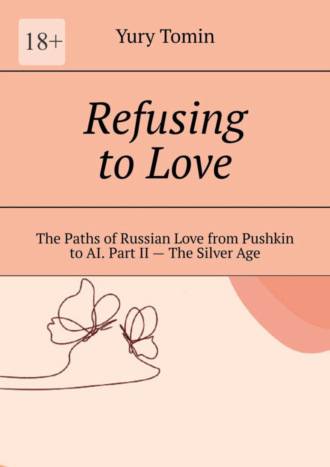
Полная версия
Refusing to Love. The Paths of Russian Love from Pushkin to AI. Part II – The Silver Age
In search of an answer to the question of the feasibility of the earthly embodiment of the Eternal Femininity, Blok in 1911 discovered the works of the Swedish writer August Strindberg, where, behind love tragedies and family troubles, the underlying causes of the eternal struggle of the sexes are revealed and the path along which «culture will follow in creating a new type of man» is illuminated. Reflecting on the new man, Blok imagines a different combination of «masculine and feminine principles» – their «harmonious distribution» – than the one created so far by culture. At the same time, in the conditions of a «changed life» these principles should not degenerate – the masculine should be open, firm, truthful, and the feminine should not turn into «womanhood.» Choosing, like Strindberg, the path of masculinity, Blok speaks of a preference «to be left alone with one’s cruel fate, when there is no real woman in the world, whom only an honest and austere soul can accept.»
Blok’s fragmentary thoughts about a new type of man in the article In Memory of August Strindberg (1912) were a rare turn of the poet to a profound reflection of his supersensual experience and mystical insights. By this time, he had already become disillusioned with the collective efforts of the Russian creative intelligentsia, initially united by «wide acquaintance with the French symbolists,» and then gathered in a religious-philosophical society to develop the teachings of Vl. S. Solovyov, Blok’s spiritual inspirer. He was closer to those who carried within themselves internal chaos, manifested in bursts of «lonely ecstatic states; this is the best thing that happened, and what brought real results.»
Meanwhile, in the Russian «intelligent society» there had already emerged turbulent currents, which, deepening the course of comprehension of the spiritual nature of man, branched out and followed parallel courses. A close friend of the Blok family, the poet’s rival in love, creativity and worldview, Andrei Bely, became an ardent follower of the anthroposophical movement led by Rudolf Steiner, which, in his opinion, was engaged in «the study of human life in Sophia.» Blok remained indifferent to the new philosophy, which had as its practical goal to help «the individual to become a more moral, creative and free personality – capable of actions motivated solely by love.» According to Andrei Bely, Blok believed that Sophia, as the soul of the world, reveals itself not to the collective consciousness, but to individual mystics, their poetic consciousness, and this knowledge cannot «be clothed in metaphysical speculation,» but only «transmitted in subjectively intimate lyrical outpourings.» Before we, at this fork in the road, follow, together with Andrei Bely, the «systematic» development of the theme of the Beautiful Lady in anthroposophy, let’s take a quick look at two more stages in the life of the symbolist poet Alexander Blok.
In the spring of 1914, Blok became infatuated with the actress Lyubov Delmas, who performed incomparably in the role of Carmen. However, in the poems dedicated to the dazzling Carmen there are no longer symbolic images of the Beautiful Lady, and in the memoirs of his wife we learn that «only with her did Blok recognize the desired synthesis of both loves.» Perhaps the «sunny cheerfulness» of the Ukrainian Carmen-Delmas momentarily revived the first love in the poet’s soul?
You are like the echo of a forgotten hymnIn my black and wild fate.Oh, Carmen, I’m sad and wondrous,That I had a dream about you.Spring trembling, and babbling, and rustling,Eternal, wild dreams,And your wild beauty —Like a guitar, like a tambourine of spring!Having completed the hopeless search for the embodiment of Eternal Femininity in the representatives of the beautiful half, the poet continued to listen to the signs of the New Goddess in the broad social mass – the folk element, in which one could sense «the slow awakening of a giant… with some kind of grin on his lips.» He prophetically felt the gap between the mass of people and the intelligentsia flirting with it, since he did not see sincere compassion and true love in this going to the people on the one hand, but heard the roar of the «mad troika flying straight at us» on the other.
After the February revolution and then the Bolshevik coup, the poet still remained optimistic in 1919:
All these are temporary countenances, masks, glimpses of endless faces. This flickering marks a change in the breed; the whole man began to move, he woke up from the age-old sleep of civilization. Spirit, soul and body are captured by a whirlwind movement: in the whirlwind of spiritual, political, social revolutions, with cosmic correspondences, a new selection is made, a new man is formed: man – a humane animal, a social animal, a moral animal is rebuilt into an artist, to use Wagner’s language.
However, two years later he sees that life has changed, but has not become new – «the louse has conquered the whole world,» and on that life «that we loved» there is «dirt and the marks of human hooves.» It is symbolic that in the diary entries of the last year of his life, Blok often turns to Pushkin, comparing his life path with him, and shares the change in the great poet’s experience of the feeling of freedom from the «simple hymn» of a loving heart to «give no account to anyone.»
And then, rising above decay,You will discover the Radiant Face.And, free from earthly captivity,I will pour my whole life into a final cry.In Memories of Blok, written almost immediately after the death of Alexander Blok in 1921, Andrei Bely continued his eighteen-year conversation with «the most profound Russian poet,» who was «a part of myself» and with whom he shared «difficult experiences of the mystery of human relations.»
III
Rendezvous in a remote restaurant. Damn confused. The attraction of the amethyst ring. Deadly compromises of high love. A tribute to sensuality. Self-poisoning with love. Guardian of the threshold to the supersensual world. Work on the temples of the body. Temptations of bright chivalry. Victory over mania. Berlin’s pubs madness
In February 1912, in a modest restaurant in St. Petersburg, Alexander Blok and Andrei Bely met again, who, even before their first meeting in January 1904, when the beautiful young married couple of Bloks visited in Moscow the close acquaintance in absentia poet-symbolist Andrei Bely, were forever bound by the spiritual kinship of «seeking the way» to «new dawns», and then «the devil misled», taking Blok from the brotherhood of the servants of the Beautiful Lady to the Night Violet, weaving the lace of love between Bely and Blok’s wife, bringing Bely to the brink of murder or suicide and «hatching» the decision to call Blok to duel, but could not break the thinnest threads connecting these «two sons of harmony.» In the fate of both, this was the period of the formation of a new stage of life, when, having lost their way, brightly illuminated by the dawns of symbolism, after evil blizzards and «the whirling of endless, ugly demons,» each found himself far after the inevitable fork in the road. Blok shared his spiritual path with Strindberg, and Bely was pushed by providence into the arms of Steiner’s witnesses and the trails of anthroposophy.
Wishing to support Blok, who, as Bely felt, suffered in his «tormenting life,» being carried away by gypsies, wine, and random women, he spoke in detail about his own inner life, in which esotericism, the secrets of initiates, spiritual exercises emerged as inevitable milestones of destiny, colliding first with the missionary of occultism in Russia Anna Mintslova, who gave Bely, before her mysterious disappearance, a ring with the emblem of the Rosicrucian brotherhood and «several evangelical sayings – as „identification marks“ in case of a possible meeting,» and then with the artist Asya (Anna Turgeneva) who was prone to mysticism. Moreover, in Asya, Bely apparently still found a compromise «between Divine and non-divine love,» abandoning his own conviction that «the greatest insight of the world should not approach middle ground.» Blok, who was less impressed with Asya than her sister Natasha upon meeting her, asked whether Bely was happy with his relationship with Asya, «and on learning that he was, it was as if he were surprised; but – he said nothing.»
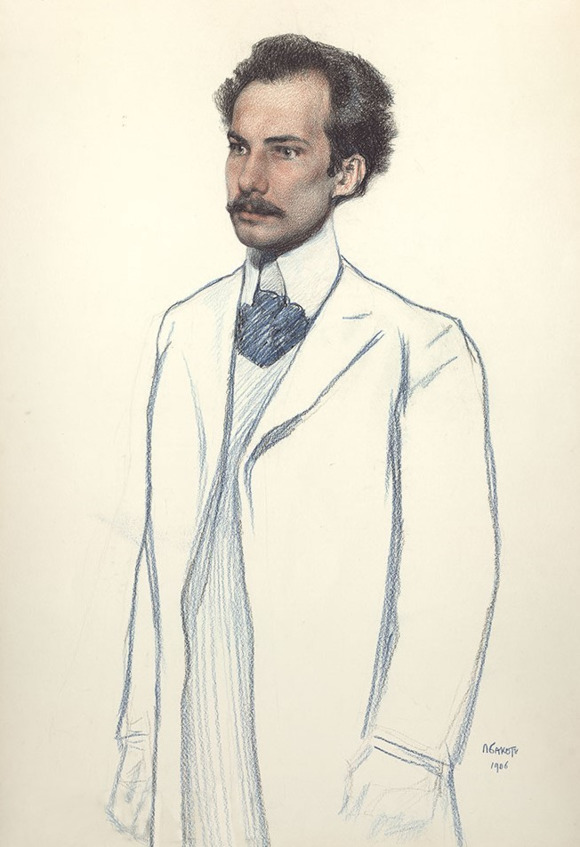
Boris Nikolaevich Bugaev – Andrei Bely (1880—1934)
With the «compromise» of high love, Bely had already twice experienced a mortal combat. At the end of 1903, he became close to Nina Petrovskaya, a member of literary circles, who had the ability to listen with understanding to Bely’s spiritual outpourings, so that he considered her like-minded in the necessity of knowing God in oneself through «mystical love for the Soul of the World,» which, being transferred to the «earthly image» would only be a return to pagan practices of love. When spiritual intimacy involuntarily turned into romantic rapprochement, Bely had to experience the harsh consequences of his «fall.»
Конец ознакомительного фрагмента.
Текст предоставлен ООО «Литрес».
Прочитайте эту книгу целиком, купив полную легальную версию на Литрес.
Безопасно оплатить книгу можно банковской картой Visa, MasterCard, Maestro, со счета мобильного телефона, с платежного терминала, в салоне МТС или Связной, через PayPal, WebMoney, Яндекс.Деньги, QIWI Кошелек, бонусными картами или другим удобным Вам способом.
Примечания
1
«Words arranged in the form of verse have ceased to be just words: they have become musicalized.» Indeed, as the culturologist and semiotician Yu. M. Lotman noted already in the 20th century, despite the «unfreedom» of a poetic text in comparison with prose, it is more informative, since «the verse structure reveals not just new shades of meaning of words – it reveals the dialectics of concepts, that internal inconsistency of the phenomena of life and language, for the designation of which ordinary language does not have special means.»
2
With the worldview of philosopher-poet Vl. S. Solovyov and the intertwining of his love stories with the heroes of the Golden Age of Russian love we introduced readers in the first part of this book.




